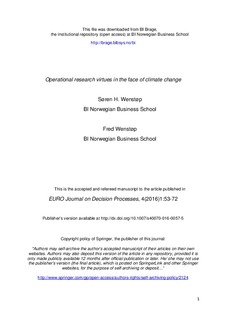| dc.contributor.author | Wenstøp, Søren H. | |
| dc.contributor.author | Wenstøp, Fred | |
| dc.date.accessioned | 2016-11-29T13:20:43Z | |
| dc.date.available | 2016-11-29T13:20:43Z | |
| dc.date.issued | 2016 | |
| dc.identifier.citation | EURO Journal on Decision Processes, 4(2016)1:53-72 | nb_NO |
| dc.identifier.issn | 2193-9438 | |
| dc.identifier.issn | 2193-9446 | |
| dc.identifier.uri | http://hdl.handle.net/11250/2423485 | |
| dc.description | This is the accepted and refereed manuscript to the article | nb_NO |
| dc.description.abstract | This paper argues that the virtue of righteousness sustained by raw emotions can explain the apparent deadlock of the climate change debate, and proposes virtues that are more conducive to consequential action.
The expectation that operational researchers are virtuous is based on an honorable tradition. Virtues are even more important now, especially in the context of climate change where a public debate is unfolding; in which deniers and believers accuse each other of lack of virtue. Scientists are in the midst of the debate whether they like it or not. Rational multi-criteria decision processes require deliberation involving values infused by temperate emotions, not to be caught up by strong emotions from righteous affect. They also require an instrumentality directed at practical engagement with physical reality. The origin of all values is raw affects in the emotional centers of our ancestral brains, which power the virtues that make us righteous, as well as the tempered qualitative feelings that are necessary for sound decision-making. Different communities nurture different self-reinforcing righteous positions, explaining why a meaningful climate change debate often gets side-tracked. Scientists are not exempt from righteousness but are in a position to dampen its effect by nurturing virtues that promote good science when they deal with climate related issues. In this article we identify several virtues that we believe are conducive for scientists’ work with mitigation and adaption. For example is important to be humble and avoiding hubris in geoengineering. And with regards to recovery and restoration of nature it is important to be open and accommodative with ecological sensitivity, care and patience. In general, work with mitigation and adaption requires respect for people, respect for science, accuracy and concern. A scientist should also have the courage to speak out about facts and thereby contribute to a more temperate and informed public debate. Thus courage and factualism are also important virtues. | nb_NO |
| dc.language.iso | eng | nb_NO |
| dc.publisher | Springer | nb_NO |
| dc.title | Operational research virtues in the face of climate change | nb_NO |
| dc.type | Journal article | nb_NO |
| dc.type | Peer reviewed | nb_NO |
| dc.source.journal | EURO Journal on Decision Processes | nb_NO |
| dc.identifier.doi | http://dx.doi.org/10.1007/s40070-016-0057-5 | |
| dc.description.localcode | 1, Forfatterversjon | nb_NO |
